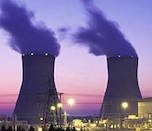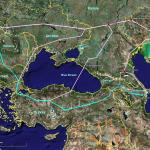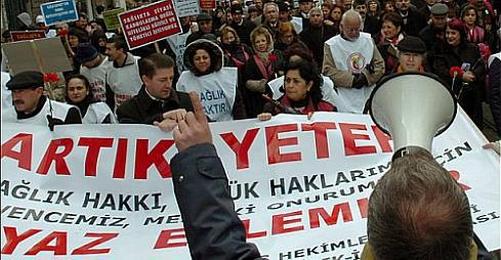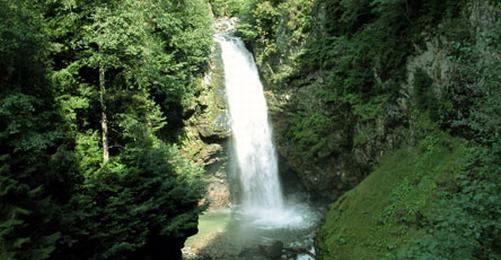Turkish Atomic Energy Authority (TAEK) chairman Okay Cakiroglu said Wednesday that Prime Minister Recep Tayyip Erdogan had personally chosen Sinop from among eight alternative locations identified by 43 separate criteria, ranging from temperature of sea water, to local climate, wind and air conditions.
Energy Minister Hilmi Guler has already held talks with 10 Turkish companies and a model has been decided on for the nuclear power.
"What we want to do," Guler said Thursday, "is to build these with the skills of the private sector. They have expressed a desire to do this according to a model where the state will also contribute."
Guler said the model would involve the private sector working together with the public sector in nuclear power and added, "we see this as the sharing of risk. It does not have a Treasury guarantee from the beginning. There will be a model on the sales of the electricity that will be produced. If sales fall below this, the public sector will meet the rest."
According to the Minister, this is referred to as the Ireland Model and has already been put into practice by the Ministry of Transport at airports and terminals.
TTB concerned of cancer threat
The nuclear power station announcement comes simultaneous to the results of a Turkish Physicians Union (TTB) research on "Cancer in Turkey After the Chernobil Accident" that was disclosed Wednesday at the Istanbul Chamber of Doctors (ITO). The research showed the rate of cancer in the Black Sea town of Hopa close to the border as being higher than the Turkish average.
Although the research is not conclusive that the escalated ratio of victims is directly related to Chernobil due to lack of official data, it was stressed that this possible connection needed further investigation.
Reaction to nuke power mounts
A day after the disclosure that nuclear power would be hosted at what once was the legendary Amazon capital on the Black Sea and is regarded by part of its population as a promising tourism resort, reactions to the decision as well as the government's overall nuclear power policy started building up.
Dr. Uyar: It's dangerous
Marmara University Faculty of Engineering Energy Sciences Division Chairman and Turkish Environment Platform (TURCEP) Coordinator Assistant Professor Dr. Tanay Sidki Uyar blasted the decision saying that it was dangerous and whatever was claimed about energy production, since the primary purpose of nuclear power stations was to build atomic weapons, Turkey should look to natural resources.
"What is even more dangerous than the power station itself is the mentality of let's build a power station and we can also build the storage system" Ural said, criticizing the government for "choosing something good not for itself but for other countries at a time nuclear energy is a system that is being abandoned everywhere."
He added that since 1978 there had been no nuclear power station orders throughout the world and that 100 such orders had been cancelled.
"A nuclear power station that cannot be sold in Europe is being proposed for Turkey" he said, arguing that nuclear power is the most expensive, most pollutant, and most useless form of energy. Uyar said Turkey was a country rich with renewable energy resources and emphasized that both wind and solar energy could meet energy demands in far more economical and cleaner ways.
Nuclear power comes with hidden costs
Turkish Environment Platform (TURCEP) Coordinator Uyar also believes that the hidden costs of nuclear energy makes it a long term burden on a country's economy. Pointing out that the cost of a nuclear power station is not just about setting it up but involves also the security infrastructure, the licensing cost, operational cost and even the cost of closing it down.
"To country's like Turkey where the security infrastructure cost is too high, the World Bank does not give credit for such investments," he said. "Also, the competent commissions and ministries of countries, just like in the USA and Canada, have to issue a new license for plants that have operated for 20 years."
Uyar pointed out that the operational cost needed to include the uranium as well as the cost of those to be employed from abroad but noted that largest cost being that of discarding such plants.
Ozerdem: Truly too expensive
Mechanical Engineers Chamber Izmir Branch Acting Chairman lecturer Dr. Baris Ozerdem meanwhile, pointed out in a written statement on the issue that "since 1997 a nuclear power station has not been built in the United States of America."
"The reason for this", he added, "is that it is expensive, other than the environmental effects of nuclear energy. It is an energy which is dependent on abroad both in way of technology and fuel in country's such as Turkey which have an underdeveloped nuclear technology."
Ozerdem also argued that Turkey's electricity power needs should be met through renewable resources and said "electricity production particularly from hydrological, wind based and geothermal renewable resources should be encouraged." According to him, one priority before Turkey should be to renew the energy transport lines to avoid a loss reaching approximately 22 percent of total production and to minimize electricity piracy.
"It should be recognized that the cleanest and the cheapest energy is energy that is saved and importance should be given to the productive use of energy and in saving it" he said. "Expensive, risk-full and foreign dependent nuclear energy should be abandoned."
Sinopbizim: Touristic sinop vs. radioactive Sinop
The Sinopbizim Platform , which has been campaigning against nuclear energy in Sinop, is preparing a variety of activities that it will increase throughout April and has dedicated a Turkish and English language site to this controversial issue.
A signature campaign by the platform challenging the nuclear power decision is underway and will remain open until the end of the month while the platform will be active in various areas of Turkey.
A statement issued by the Platform and open to signature says "We reject the idea of bringing dangerous and outdated nuclear technologies into our country with excessive loans. To fulfill the Law for 'Procedures to Generate Electrical Energy Using Renewable Energy Resources' that was passed on 10.05.2005, we demand the government to give priority to rich alternative energy sources, and make a serious start to build the necessary infrastructure for the production of renewable energy." (EZÖ/EK/II
(A full English language text of the statement can be found HERE )
















